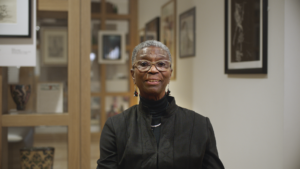‘RIP SENI’ (UK, 2021) Daisy Ifama, and Lizzie Reid film directors in conversation with Khalid Ali, film, and media correspondent
‘RIP SENI’ world premiere at the Sheffield Doc / Fest 6th June 2021, https://sheffdocfest.com/film/rip-seni
On the 24th of June 2020, a graffiti reading ‘RIP SENI’ appeared on a public artwork outside Bethlem Royal Hospital, a psychiatric unit in South London. The artwork “Some Questions About Us” is made up of eight mirrored placards asking questions about mental capacity and assessment. It had been created by Turner-prize nominee Mark Titchner and commissioned by Bethlem Gallery’s Mental Health and Justice project. The red spray-painted letters reminded the local community of the tragic death of Seni Lewis, a 23-year-old black man.

On the evening of Sunday 29th of August 2010, Seni’s family and friends noticed that he was behaving strangely. Seni had no prior history of mental illness. Seni was then admitted as a voluntary patient at Bethlem Royal Hospital. Within hours of leaving him at the hospital, Seni’s family were to learn that he had collapsed after being restrained by 11 police officers. Seni was then transferred to Mayday Hospital, where he was declared brain stem dead.
‘RIP SENI’ is a short film revisiting Seni’s untimely death by documenting multiple perspectives from Seni’s friends and family, mental healthcare professionals and Bethlem Royal Hospital service users. Featuring candid group discussions between Ajibola Lewis (Seni’s mother), Marcia Rigg, Anna Susianta and Donna Mooney (campaigner against indefinite imprisonment (IPP)), who have all lost loved ones at the hands of the state, the film portrays the power of peer-support in a community coming together fighting institutional racism and social injustice.
Since 2010, the Lewis family campaigned relentlessly to get an inquest into the circumstances of Seni’s death. In 2017, after 29 days of evidence, the jury issued a unanimous verdict that the force used by police officers was “excessive, unreasonable, unnecessary and disproportionate”. Despite the jury’s verdict, the police officers involved were cleared of all wrongdoing over Seni’s death.

In 2018, the Mental Health Units (Use of Force) Act, or ‘Seni’s Law’ was passed because of the Lewis family and their local MP Steve Reed’s campaign. The Bill mandates increased protection and oversight on the use of force in mental health settings. However, it does not apply to the use of force by the police, in mental health units or otherwise.
Daisy Ifama, the film director states: “In September 2020 I was approached by Lucy Owen at Bethlem Gallery, and Ajibola Lewis, Seni’s mother, to work collaboratively in developing a short documentary. I live in Lewisham, and I have known the name Olaseni Lewis since I was 16 years old, but it was not until working with the Lewis family, speaking with members of the United Families & Friends Campaign, and reading the details of their inquest investigations that I really understood the true horror at the centre of these stories and the insidious levels the state will go to protect itself. I linked up with Lizzie Reid to find a way to pull together the different strands of the story; the wide-ranging personal experiences of mental health, justice, community, and art”.
Lizzie Reid, the film’s co-creator, elaborates further: “Alongside the story of the graffitied artwork, it was particularly important for us to bring in the voice of the women who meet regularly for years to support each other, and to fight the prevalent social injustice in police custody and mental care institutions. The public do not know of such stories.”
Dr Shubulade Smith, OBE, highlights the serious impact of racism in mental health settings on Black, Asian, and Minority Ethnic (BAME) communities; Seni’s story will intimidate BAME groups, and scare them away from seeking mental health support when needed.
The film exposes alarming facts; “according to the charity INQUEST, 1,782 people in England and Wales have died following contact with police since 1990, nearly half of whom were suffering from mental health issues”.
Reflecting on the significance of the film, Ajibola Lewis, Seni’s mother commented: “‘RIP SENI’ shines a light on the constant need for change in mental health services, the police and other state agencies where people are often unnecessarily restrained. We have to continue to get the message out there because there’s still so much work to do … we don’t want anyone else to die like Seni did and we certainly don’t want the death of restraining a person to be on the conscience of anyone. RIP SENI 🙏🏽”.
The film sponsors are Bethlem Gallery, Wellcome, Mental Health and Justice and King’s College London.